Tag Archives for " Aviation "
So You Have Your Avionics, but Now You Have Questions. We Have Answers
Award-winning aviation product support team is here to help answer your questions!
Whether you’re a new pilot preparing to outfit your first single-engine aircraft or managing a fleet of business jets that just received an avionics upgrade, navigating the ins and outs of Garmin aviation products is bound to bring up some questions. The good news is our dedicated and award-winning aviation product support team is here to guide you along the way with answers to your questions and plenty of expertise.
With a relentless focus on customer service, the avionics product support team has earned numerous accolades and has ranked at the top of two industry publication surveys for two decades running. That’s right, the Garmin product support team has been deemed No. 1 for exceptional customer service for 20 consecutive years in Professional Pilot’s Avionics Product Support Survey and Aviation International News’ Avionics Product Support Survey.
From sharing a helpful Garmin welcome kit to cluing you in on the best times to call to providing training tools – and everything in between – we’ve prepared a list of frequently asked questions and answers to help you stay the course.
Q: What should I know about the Garmin Welcome Kit?
A: Designed to streamline your setup process, the Garmin Welcome Kit walks you through everything from creating a flyGarmin account to accessing training resources. Access your hassle-free kit and let’s get you flying faster.
Resource: https://support.garmin.com/en-US/aviation/faq/p8w5RFfiVF3ikIxRZaFq47/?textPage=1
Q: When is the best time to contact Garmin aviation support with questions?
A: To avoid peak call times, reach out to our team earlier or later in the day. We recommend calling before 10 a.m. Central Standard Time (CST) and after 4 p.m. CST for the fastest possible service. If you do call during higher volume periods, which could include Mondays, lunchtime and database weeks, consider opting for an automated return call to save you waiting time.
Resources: https://support.garmin.com/en-US/aviation/faq/wKYZ8v8G5J96T1YTAuTky7/ … and https://support.garmin.com/en-US/ql/?focus=topics
Q: What training resources does Garmin have?
A: We have a host of comprehensive training tools, including manuals, self-study options, eLearning and instructor-led courses. From our GFC 500 Autopilot Essentials to in-person GTN/TXi Training Classes, we have something for everyone. Our experienced instructors are here to support pilots of all levels.
To discover all of our training products, click here or explore the tools listed below.
Resource: https://www.garmin.com/en-US/aviation/training/
Q: What’s the easiest way to maintain databases?
A: FlyGarmin.com makes it easy to purchase databases for your avionics. With our time-based subscriptions, your aviation database subscription can automatically renew each year, ensuring consistent and reliable support. With select avionics, Garmin Pilot’s Database Concierge or GDL 60 with PlaneSync technology can help automate the downloads.
Resource: https://support.garmin.com/en-US/aviation/faq/vxa27TcTIu9dKKtNaPKQ98
Q: How do I stay informed on software for my certified avionics?
A: Software for your avionics is updated through an authorized Garmin Dealer or OEM Service Center. You can get software updates and other important information — like service alerts and service bulletins — when you sign up for email notifications on Fly.Garmin.com. Additionally, be sure that your equipment is registered by using this link.
Q: Where is the Unit ID or System ID on my aviation device and why are they important?
A: Your device’s serial number is crucial for registration and warranty purposes, while the Unit ID (System ID) is essential for database updates. Ensure correct System ID for seamless updates on fly.Garmin.com. Use the steps listed in the below resource to identify your Unit ID or System ID.
Resource: https://support.garmin.com/en-US/aviation/faq/7bHu8HlEbA327rYcJVktC7?textPage=1
Q: Where can I find the most recent aviation service alerts, advisories and bulletins?
A: Stay informed about aviation service alerts and advisories on our dedicated support page listed below. We keep you updated to ensure safe and smooth flights for the days, months and years ahead.
Resource: https://support.garmin.com/en-US/aviation/faq/6uYPdAQOaS9FzhhL5yaOf5
For more information and resources, visit our website and unlock the full potential of your Garmin avionics.
The post So You Have Your Avionics, but Now You Have Questions. We Have Answers appeared first on Garmin Blog.
https://www.garmin.com/en-US/blog/aviation/so-you-have-your-avionics-but-now-you-have-questions-we-have-answers/
Garmin Aviation Tech Featured in Sky Warden, a U.S. Special Forces Combat Aircraft
Garmin commercial-off-the-shelf (COTS) solutions provide innovative and cost-effective technology for government and defense operators.
An L3Harris Intelligence, Surveillance and Reconnaissance (ISR) aircraft based on an airframe pioneered by Air Tractor, Sky Warden will provide short takeoff and landing capabilities, a small support footprint and allow the aircrew who operate it to integrate more effectively with ground units. And now, thanks to the installation of the Garmin G3000® integrated flight deck, it’s also known for its forward-thinking digital avionics suite — making it the perfect selection for the U.S. Special Operations Command (USSOCOM) Armed Overwatch program.
The modified crop-duster platform was selected by USSOCOM for up to 75 manned, fixed-wing aircraft. The presence of the G3000 on board means those aircraft will be equipped with the latest communication, surveillance air traffic management (CNS/ATM) and navigation capabilities in COTS solution based on the Garmin avionics Modular Open System Architecture (MOSA) design.
The Sky Warden, the first forward-fit deployable combat aircraft to feature the G3000 system, also includes terrain awareness and warning system (TAWS), Traffic Collision Avoidance System (TCAS) and automatic dependent surveillance-broadcast (ADS-B IN) traffic. Even better? It’s equipped with the Garmin GFC 700 digital autopilot as well, meaning the glass flight deck is also fully equipped with a flight director, autopilot, yaw damper, and automatic and manual electric trim capabilities — not to mention a high level of digital sophistication.
700 digital autopilot as well, meaning the glass flight deck is also fully equipped with a flight director, autopilot, yaw damper, and automatic and manual electric trim capabilities — not to mention a high level of digital sophistication.
The G3000 system boasts specific features to make it an attractive option for government and defense operators, including the ability for operators to transition seamlessly between civil, restricted and combat airspace with real-time situational awareness and connectivity. Plus, the L3Harris Widow® mission computer integrates features like weapons systems interfaces and the Thales helmet-mounted cueing system to the G3000.
Before Garmin’s avionics landed in the Sky Warden, Garmin teamed up with L3Harris back in 2018. The tandem Garmin-integrated flight decks by Tactical Air Support, Inc. (TacAir) were outfitted by L3Harris within a fleet of supersonic F-5 fighter aircraft. That configuration also included a G3000 integrated flight deck high-resolution display, as well as dual Garmin touchscreen controllers.
Not All Solutions Are Created Equal
Looking for a COTS solution for a government and defense program? Not a problem. Garmin can provide COTS solutions that meet a range of platform, scheduling and pricing needs. With prior experience in the U.S. Air Force, U.S. Navy, U.S. Army and foreign militaries, these Garmin COTS solutions can help reduce life-cycle cost and development time in addition to providing a faster technology integration. Reach out here to connect with our sales team or to learn more about our government and defense programs, click here.
The post Garmin Aviation Tech Featured in Sky Warden, a U.S. Special Forces Combat Aircraft appeared first on Garmin Blog.
https://www.garmin.com/en-US/blog/aviation/garmin-aviation-tech-featured-in-sky-warden-a-u-s-special-forces-combat-aircraft/
How Garmin Supports Women in Aviation
Garmin is no stranger to the world of aviation. We create products that help make flying safer, easier and simpler. Our associates want everyone to experience the feeling of soaring through the sky with breathtakingly beautiful views — and we want them to feel safe while doing it.
We also hope to make careers in the aviation industry and learning to fly less intimidating and more accessible for our customers and associates — especially women. It’s no secret that the aviation industry is comprised predominantly of men. Currently in North America less than 5% of pilots are women, but Garmin is working to change that.
“How?” you might ask. We’ll start with our associates. We want to share our passion for taking to the blue skies with anyone willing to jump in — or takeoff, if you will. Garmin hosts Flight Sim First Fridays, a day when associates are encouraged to utilize Garmin’s flight simulator to expand their knowledge and experience of flying with Garmin avionics.
Want to go even deeper? Garmin offers its very own ground school at no cost to Olathe-based associates. Whether you want to go on to learn to fly or just want to get some more knowledge about aviation, our very own woman in aviation, Jessica Koss, is there to help. Koss has been teaching ground school and sharing her passion for aviation with Garmin associates since 2017.
“I have had the pleasure of teaching private pilot ground school at Garmin for over seven years,” says Koss, a team leader in Garmin’s corporate flight department. “It’s exciting when associates take the class and are unsure if they’re interested in becoming a pilot, only to later take lessons, get their license, and pursue more advanced ratings and licenses. I am always reminded how impactful one class can be; it’s all about taking that first step.”
In addition to ground school, Garmin offers a partial reimbursement program for associates who want to earn their pilot’s license. The cost of renting an airplane, fuel, hiring a certified flight instructor (CFI) and more is definitely an investment, and that’s why Garmin works with local flight schools to make it a little easier to achieve that final “checkride” feeling.
Since 2020, Koss has taught more than 200 associates with close to 20% being women looking to learn more about aviation. Many have chosen to earn their pilot’s license after taking Koss’ class, and one went all the way to earning her commercial pilot’s license. Koss’ impact can’t be measured in numbers, though. Her passion for aviation runs deep and is seen and experienced by everyone around her, including Isabell Grisnik, an aviation associate sales manager.
“When I started at Garmin, I was doing university recruiting — a job completely unrelated to our aviation segment,” Grisnik said. “During a new associate orientation, I first heard about Garmin’s flight benefits, and it sparked my curiosity. Later, Garmin celebrated Women of Aviation Week, and a female Garmin aviation engineer joined me at a local school to present engineering career opportunities for women to students. After that day, I started to think about the possibilities of me learning to fly and if it was even feasible.”
Grisnik met with other women at Garmin, including Koss, and realized she wanted to pursue a career in aviation. She took Garmin’s ground school, went on to get her private pilot’s license and is currently working on her instrument rating.
“While flying, I learned about Garmin’s aviation products and realized how amazing they were and thought ‘I could sell these,’” Grisnik said. “I joined the aviation sales team, and the rest is history. I was able to do all of this because of the opportunities Garmin offered. They made it so accessible for me.”
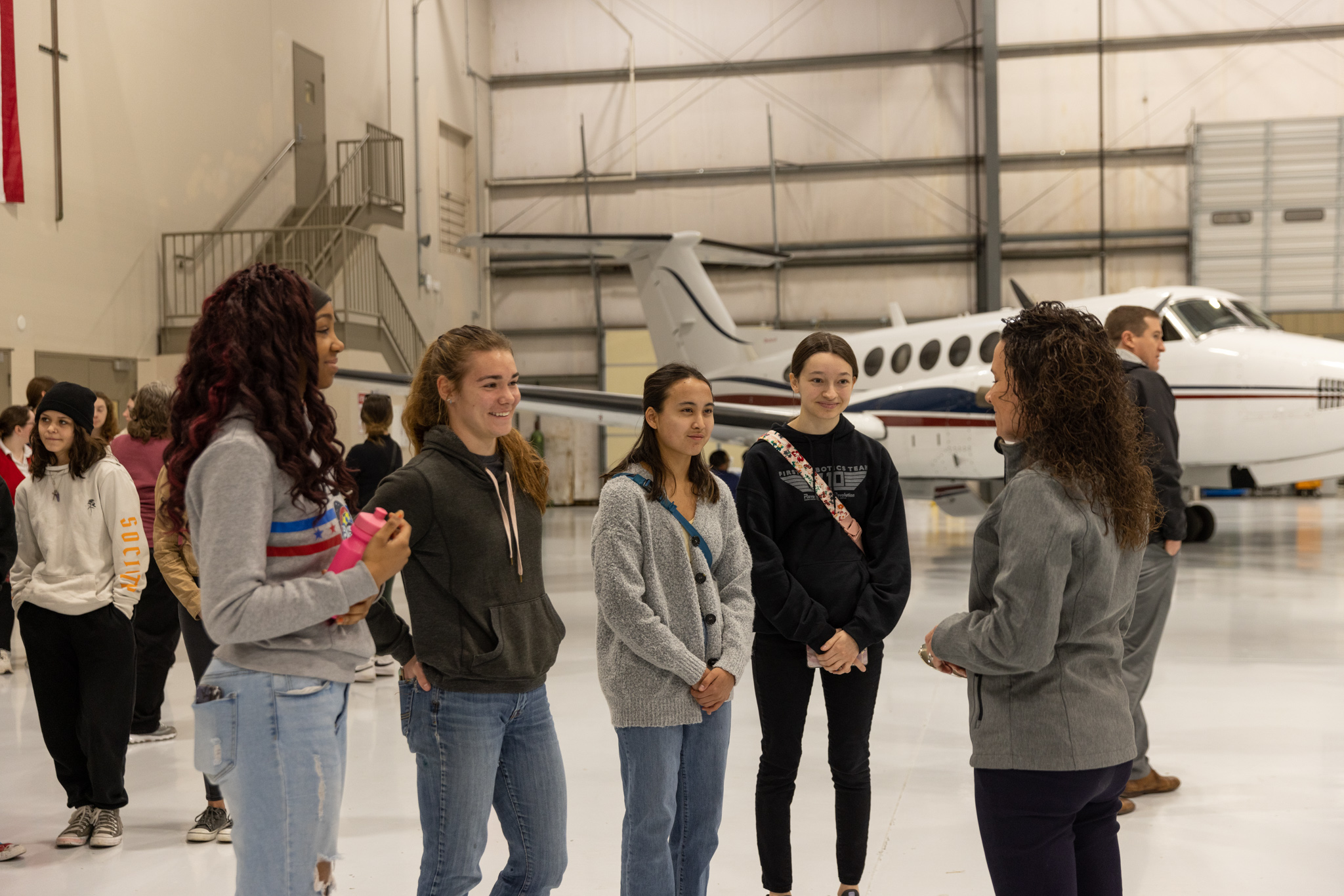
In addition to sharing our passion with our associates, we want to do the same for our community. Garmin celebrates Women of Aviation Week every March, hoping to inspire more young women to want to fly or work in the aviation industry, just like Grisnik. Throughout the week, Garmin will host young girls at our hangar to see what it’s like to fly in a small airplane. Associates will visit local schools to teach students about aviation and do a fun activity, and students on field trips will visit to Garmin headquarters for tours and a real-life look into how avionics are made.
“It is so important for younger women to be exposed to a variety of careers in aviation, and Garmin gives them that opportunity,” Koss said. “From being a pilot to having a career in aircraft maintenance, engineering or air traffic control, these young women have a chance to experience how fun and rewarding a career in aviation can be. When I take these girls flying, it is often their first time in a small airplane, and when I ask, ‘Do you want to take the controls?’, their faces immediately light up. These experiences are so important for the future of aviation, and I am thankful that Garmin and so many other organizations value the promotion and advancement of women in this industry.”
The post How Garmin Supports Women in Aviation appeared first on Garmin Blog.
https://www.garmin.com/en-US/blog/aviation/how-garmin-supports-women-in-aviation/
Which Garmin Aviation Watch Is Right for Me?
Whether you’re a pilot or an aviation enthusiast in the market for a smartwatch, you’ve come to the right place. Garmin is at the forefront of engineering aviation smartwatches and has several options to fit your needs.
Pilots can take to the skies confidently with aviation-specific features while also taking advantage of fitness features Garmin smartwatch users have come to love over the years.
All watches are designed for round-the-clock wear and can connect with the Garmin Pilot smartphone app to seamlessly transfer flight plans and view the list of waypoints included in a route right from your wrist.
smartphone app to seamlessly transfer flight plans and view the list of waypoints included in a route right from your wrist.
So which Garmin aviation watch is right for you? Let’s dive into that.
1. D2 Mach 1 Pro
Mach 1 Pro
Be prepared for anything — day or night — with a built-in flashlight and advanced flying and fitness tools. The most advanced Garmin aviation smartwatch, this premium and luxury smartwatch comes with a scratch-resistant, diamond-like carbon (DLC) titanium bezel and bracelet and so much more. From a vibrant AMOLED display to up to 25 days of battery life1 and advanced tools for flying and fitness, the D2 Mach 1 Pro has it all.
If you’re obsessed with a sharp smartwatch with premium materials such as sapphire and titanium, as well as having the most features possible, this smartwatch packs a punch. Think Direct-to navigation, in-flight maps, real-time weather reports and airport information, flight logging, jet lag adviser and loads more. On the ground and in the air, track your health and fitness, sleep, stress, heart rate2, workouts and more.
Furthermore, if you fly an aircraft that uses PlaneSync , the D2 Mach 1 Pro can be used to access the aircraft dashboard to quickly reference fuel level, electrical status, database and location information.
, the D2 Mach 1 Pro can be used to access the aircraft dashboard to quickly reference fuel level, electrical status, database and location information.
2. D2 Mach 1
Mach 1
Let’s not forget about the well-regarded D2 Mach 1, a classic-style watch that provides many of the same flying tools and features as its Pro counterpart, including the worldwide aeronautical database, moving map, Next Generation Weather Radar (NEXRAD) and more.
Plenty of perks to get you pointed — and flying — in the right direction.
The D2 Mach 1 is offered with the option of either a vented titanium bracelet or an oxford brown leather band. Both choices come with an additional black silicone watch band.
3. D2 Air X10
Air X10
How about the D2 Air X10? This stylish smartwatch allows pilots to take calls from and use their compatible smartphone’s voice assistant to send texts and more3. It comes with numerous preflight, in-flight and postflight tools such as airport weather updates, Direct-to navigation capabilities and flight logging — just to name a few.
Like the others, the D2 Air X10 has all of the health and wellness features as well as the indoor and GPS sports apps you need to lead a healthy lifestyle.
But the sleek look and feel is what the D2 Air X10 is known for. With durable Corning® Gorilla® Glass 3 and a stainless steel bezel, plus two color choices, this smartwatch will match your look for each arrival.
4. MARQ® Aviator (Gen 2)
As a member of the second-generation MARQ collection, the MARQ Aviator is an absolute stunner. Built with Grade-5 titanium and swept-wing links and locking clasp for an ultradurable design, the luxury modern tool aviation watch has a domed sapphire lens, providing a crystal-clear view of the stunning AMOLED display.
But the MARQ Aviator is much more than an eye-catching watch. It can keep track of time around the world with 24-hour GMT bezel markings, help you acclimate to new time zones and get you where you need to go with many aviation-focused features.
So whether you fly for work or leisure — or both, for that matter — Garmin is prepared to take to the skies with you.
Shop Garmin aviation portable GPS, smartwatches and apps here.
1Battery life based on D2 Mach 1 Pro when smartwatch mode is enabled
2See Garmin.com/ataccuracy
3Certain smartphones are not compatible with D2 Air X10 voice functionality features; see Garmin.com/D2AirX10Phones
The post Which Garmin Aviation Watch Is Right for Me? appeared first on Garmin Blog.
https://www.garmin.com/en-US/blog/aviation/which-garmin-aviation-watch-is-right-for-me/
Garmin PlaneSync Technology Simplifies Aircraft Upkeep
Kirk Fryar, the President of Sarasota Avionics, is a busy man — but Garmin PlaneSyncTM Connected Aircraft Management helps him to spend less time worrying about the details.
It’d be grand if your responsibilities as an aircraft owner started as you boarded your aircraft and ended as soon as you were back on solid ground, but that’s simply not the case. Properly managing your aircraft takes time, effort and preparation — a responsibility Kirk Fryar understands all too well in his role as the President of Sarasota Avionics, a sales and maintenance outfit headquartered in between Tampa and Fort Myers on Florida’s gulf coast.
Fryar’s a busy man, but one tool in particular has been making his life easier as of late — Garmin PlaneSync. A connected aircraft management system, PlaneSync technology enables Fryar to simplify keeping his aircraft ready to fly, which in turn allows him to spend more time in the air — or making sales, depending on the day.
One significant benefit? Simply keeping track of where your aircraft is — and what its service status is2. With the appropriate equipment, PlaneSync allows pilots to check Hobbs, tachometer and flight times, fuel quantity, battery voltage, OAT, oil temperature, aircraft GPS location3 and active/standby database status5. Fryar discovered the value of this connectivity early on after being one of the first to install PlaneSync technology.
“I was up in Atlanta, and my wife and I flew the Aztec up there and asked them to fill the airplane,” he says. “We walked to Waffle House in downtown Atlanta, and I said, ‘Let me see if they refilled the airplane.’ I could see the fuel was still sitting exactly where I dropped it off. I called them and said, ‘Hey, y’all didn’t refill the airplane like I asked you to.”
Understandably, the service staff were a little perplexed as to how Fryar was aware of that, given that he was currently at a Waffle House and not near his Aztec. After some explanation, Fryar was able to ensure that aircraft would be fueled by the time he and his wife were going to be back to the airport — all without having to leave the table.
That’s a personal use example, but the business implications for Fryar are even greater. And managing the Sarasota Avionics fleet, whether it’s checking oil and fuel levels or simply tracking the aircraft to keep tabs on where everyone is, makes the technology a no-brainer.
Yet another big advantage to PlaneSync, says Fryar, are the automatic database updates1.
“That’s the number one thing,” he says. “I just take off, and it’s good to go. It’s nice to trust that and know it’s going to be done. I’ve got six things that need database updates. There’s nothing worse than when you forget to update and you’ve got no charts on the avionics.”
If you want to check your update status prior to takeoff, all you need to do is open up the Garmin Pilot app to get both the update status and, if one is pending, when the next scheduled update will take place.
Once in the cockpit, PlaneSync technology on the GDL 60 datalink acts as a gateway to Connext, a Garmin wireless connectivity solution that allows for streamlined communication between devices. When connected, your avionics and compatible flight apps will seamlessly share weather4, traffic4, altitude information4, GPS position reference and more — rendering your mobile touchscreen a one-stop-shop for quick, easy-to-access information.
Ready to simplify your flight? Get all the PlaneSync details here. You can also visit Sarasota Avionics to have Fryar outfit your aircraft, or find a dealer near you.
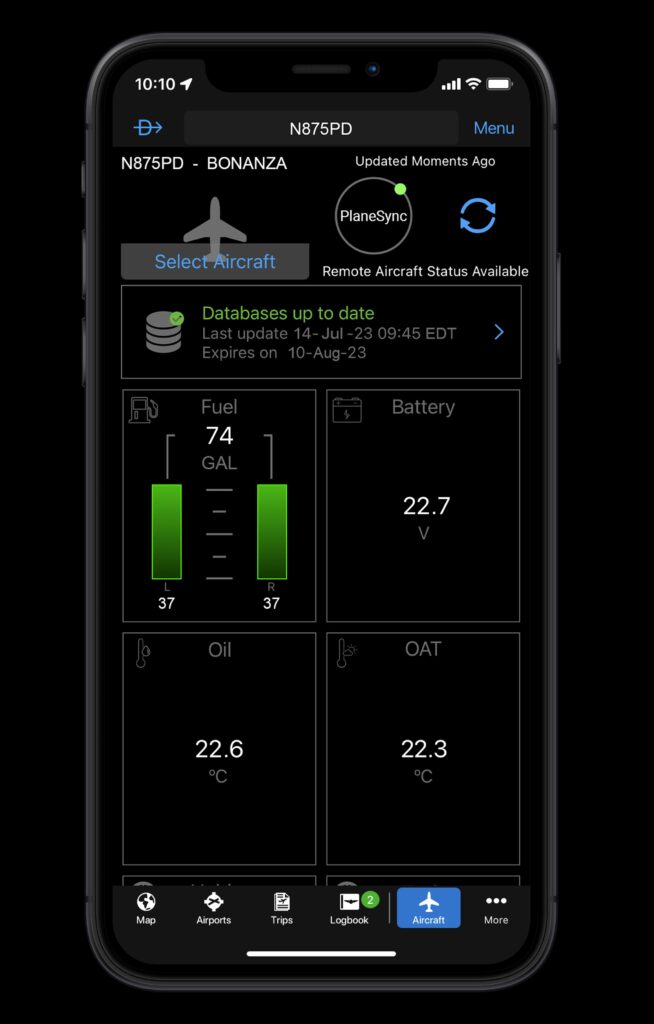
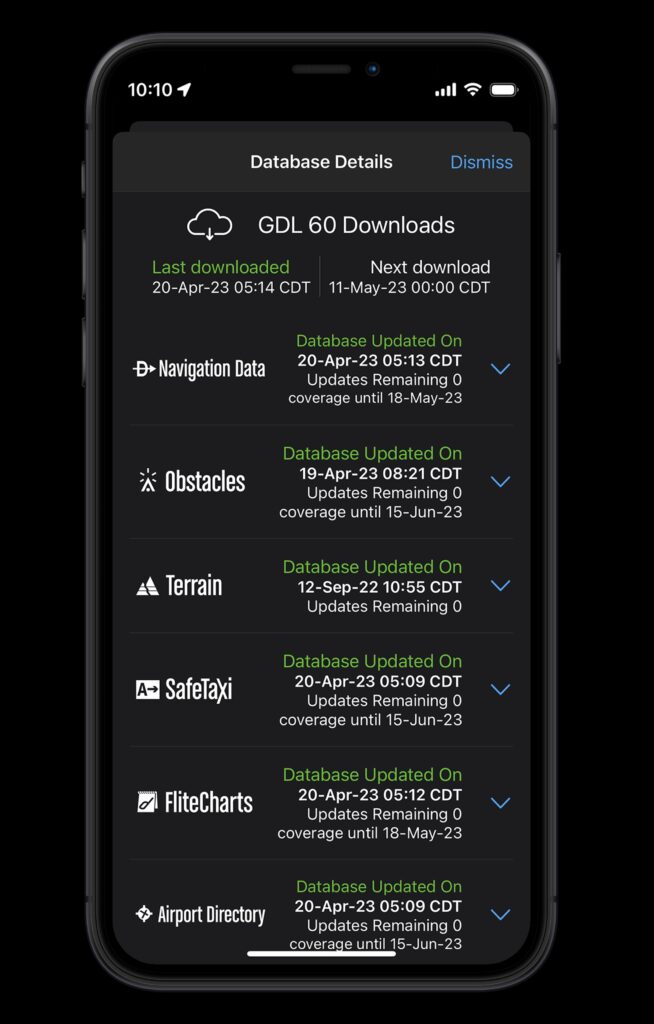
1Active PlaneSync and database subscriptions required for automatic database updates. Active PlaneSync subscription plan required for flight log uploading. Features are available on-ground only and require GDL 60 to have active LTE or Wi-Fi connectivity; signal strength and other factors may apply. See Garmin.com/PlaneSyncCoverage for LTE coverage details.
2Remote aircraft status requires active PlaneSync subscription. User’s smart device must have internet connectivity. Feature is available on-ground only and requires GDL 60 to have LTE connectivity; signal strength and other factors may apply. See Garmin.com/PlaneSyncCoverage for coverage details.
3GPS location provided by avionics. Select avionics can provide live location with a compatible GPS antenna; otherwise location displayed will be based on the avionics last known location. GPS signal strength and other factors may apply.
4Compatible avionics required
5This information is intended as supplemental information only and is not a substitute for preflight checks
The post Garmin PlaneSync Technology Simplifies Aircraft Upkeep appeared first on Garmin Blog.
https://www.garmin.com/en-US/blog/aviation/garmin-planesync-technology-simplifies-aircraft-upkeep/
2023 Garmin Holiday Lookbook
Garmin has the perfect gifts for anyone’s list.
What makes the perfect gift? An immediate ear-to-ear grin upon unwrapping? Jumping up and down? Maybe it’s all the above.
Whichever way you prefer to celebrate, Garmin has the perfect gift for anyone’s list.
Whether you’re shopping for the runner, cyclist, golfer, pilot or outdoor enthusiast in your life, our purpose-built products will help you find just the right present.
To chase their next PR:
Forerunner 265® Series: GPS Running Smartwatches
For runners who want to train brilliantly, this smartwatch with a bright AMOLED display, training metrics and recovery insights will help them shine mile after mile.
Forerunner® 965: GPS Running Smartwatch
Some runners want to be recognized under the lights. Now they can take the podium with the bright AMOLED display, plus premium running and triathlon features.
To elevate their training:
Built with advanced navigation and adaptive coaching, this cycling computer helps riders go further and train harder.
Edge® 840 Solar Powered Cycling Computer
When they want to push through the long haul, they need this cycling computer with solar charging, advanced navigation and adaptive coaching.
To promote their healthy lifestyle:
Venu 3 Series: GPS Smartwatches
They’ve got health and fitness goals and want an on-wrist coach to support them. These smartwatches come in two sizes and offer personalized wellness insights, fitness features and the ability to make calls and send texts with a compatible smartphone.
They want to focus on their health with a smartwatch that has all the essentials. Packed with a variety of fitness features, a vibrant AMOLED display and an affordable price, this smartwatch is the one for them.
vívomove® Trend: Hybrid Smartwatch
For those who want a hybrid smartwatch that’s as stylish as it is smart. With a classic analog design and essential smart features, this watch delivers the perfect look around the clock.
For parents who want to encourage healthy habits for their child and gain some peace of mind, this kids smartwatch texts and tracks1 — so they can breathe easy and stay in touch.
To unleash their inner explorer:
fēnix® 7 Pro Series: Multisport Smartwatches
When athletes train for life, they need the ultimate multisport GPS smartwatches designed to help them perform all day, every day.
epix Pro Series: Multisport Smartwatches
Pro Series: Multisport Smartwatches
There are athletes who don’t make compromises They need this multisport GPS smartwatch that helps them command everything they do.
Instinct® 2X Solar Series: Solar Powered Multisport Smartwatches
Their lifestyle is rugged and unique. This smartwatch helps them take on life’s unlimited possibilities with preloaded activity profiles, health metrics, an LED flashlight, solar charging and more.
inReach® Messenger: Satellite Communicator
For those who explore beyond the limits of cellular networks. This small, rugged satellite communicator2 has global two-way text messaging and interactive SOS alerts.
To dial in their game:
Approach® S70 Series: Premium Golf Smartwatch
For the golfers who want to improve their game both off and on the course. These golf smartwatches with AMOLED displays have everything they need to get an edge.
Approach® R10: Portable Launch Monitor
They want to play golf from anywhere with a portable launch monitor3 and golf simulator. Here’s their chance to perfect their swing no matter where they are.
To steer them in the right direction:
For drivers who want a 24/7 live view from their dash cam when they’re away from their parked vehicle. This always-connected dash cam gives them peace of mind.
zūmo® XT2: Motorcycle Navigator
For those two-wheeled adventurers, here’s the rugged motorcycle navigator with a bigger, brighter screen that finds unforgettable routes and has group tracking capabilities.
To quench their love for the water:
For boaters who want to know the water better than a local. This chartplotter provides clear, high-contrast views all around their boat with Garmin traditional, ClearVü and SideVü
and SideVü scanning sonars — plus wireless networking and built-in Garmin Navionics+
scanning sonars — plus wireless networking and built-in Garmin Navionics+ mapping.
mapping.
STRIKER Vivid 4cv: Fishfinder with Transducer
Vivid 4cv: Fishfinder with Transducer
For anglers who want to see what’s beneath the surface in clear, colorful detail. This 4″ fishfinder with included transducer is just the one.
inReach® Mini 2 Marine Bundle: Satellite Communicator Set
They love to cruise, sail and explore the open water. They need a compact GPS satellite communicator2 that can keep them in touch globally for up to 2 weeks.
quatix® 7X – Sapphire Solar Edition: Marine GPS Smartwatch
For the mariners who want to plot their paradise on the water and off it. Thanks to this GPS marine smartwatch with solar charging, they can.
To keep their head in the clouds:
D2 Air X10: Aviator Smartwatch
Air X10: Aviator Smartwatch
This GPS smartwatch gives pilots everything they need — from aviation capabilities to health monitoring, plus the ability to take calls and send texts when paired to their compatible smartphone.
D2 Mach 1 Pro: Premium Aviator Smartwatch with Vented Titanium Bracelet
Mach 1 Pro: Premium Aviator Smartwatch with Vented Titanium Bracelet
For pilots who want a premium GPS smartwatch with a built-in flashlight and the most advanced tools for flying — plus a long battery life and health and fitness features — this smartwatch will keep them on top.
Didn’t see the perfect gift? Don’t worry — there’s plenty more where that came from. Shop the Garmin website to find the perfect present.
1Active subscription plan and LTE connectivity are required.
2Active satellite subscription required. Some jurisdictions regulate or prohibit the use of satellite communication devices. It is the responsibility of the user to know and follow all applicable laws in the jurisdictions where the device is intended to be used.
3This device requires a paired compatible smartphone downloaded with the Garmin Golf app.
app.
The post 2023 Garmin Holiday Lookbook appeared first on Garmin Blog.
https://www.garmin.com/en-US/blog/general/2023-garmin-holiday-lookbook/
FltPlan Data Offers Insights into General Aviation Pilot Habits
Ever wondered about the most popular aviation flight patterns in the US? We did. So as the largest provider of flight planning services in North America, we pored through the data to provide helpful and interesting insights into when, where and how Garmin FltPlan customers are flying. Whether you’re an aircraft owner, pilot or even in charge of scheduling your company’s business travel, there’s something in this report for you.
Curious to see where you fit in with the fleet? Keep reading to learn how FltPlan users are flying.
WHEN?
Busiest Days of the Week
Weekend warriors you are not — the least popular days for FltPlan users to be in the air were Saturday and Sunday.
- Thursday
- Wednesday
- Friday
- Tuesday
- Monday
- Sunday
- Saturday
WHERE?
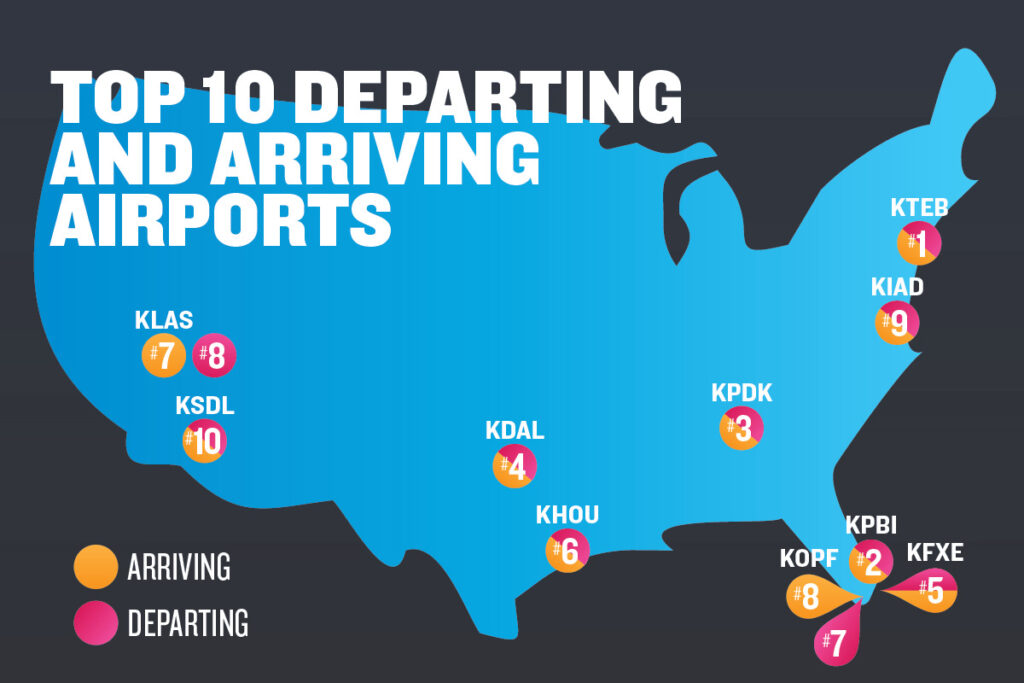
Top 10 Departing Airports
Pilots who use FltPlan are creatures of habit — and a lot of you are big fans of Florida and Texas. Whether for business or personal travel, flying to sunny cities seems to be a trend.
- KTEB – Teterboro Airport, Teterboro, New Jersey
- KPBI – Palm Beach International Airport, Palm Beach, Florida
- KPDK – DeKalb-Peachtree Airport, Chamblee, Georgia
- KDAL – Dallas Love Field Airport, Dallas, Texas
- KFXE – Fort Lauderdale Executive Airport, Fort Lauderdale, Florida
- KHOU – William P. Hobby Airport, Houston, Texas
- KOPF – Miami-Opa Locka Executive Airport, Miami, Florida
- KLAS – Harry Reid International Airport, Las Vegas, Nevada
- KIAD – Washington Dulles International Airport, Washington, DC
- KSDL – Scottsdale Airport, Scottsdale, Arizona
Top 10 Arriving Airports
If you have déjà vu reading this list, we don’t blame you — but notice an interesting difference between this and the list of the top 10 departing airports: Las Vegas and Miami are flipped. FltPlan users are slightly more likely to be arriving in Vegas than they are to be departing. Roll some dice for us while you’re out there, please.
- KTEB – Teterboro Airport, Teterboro, New Jersey
- KPBI – Palm Beach International Airport, Palm Beach, Florida
- KPDK – DeKalb-Peachtree Airport, Chamblee, Georgia
- KDAL – Dallas Love Field Airport, Dallas, Texas
- KFXE – Fort Lauderdale Executive Airport, Fort Lauderdale, Florida
- KHOU – William P. Hobby Airport, Houston, Texas
- KLAS – Harry Reid International Airport, Las Vegas, Nevada
- KOPF – Miami-Opa Locka Executive Airport, Miami, Florida
- KIAD – Washington Dulles International Airport, Washington, DC
- KSDL – Scottsdale Airport, Scottsdale, Arizona
HOW LONG?
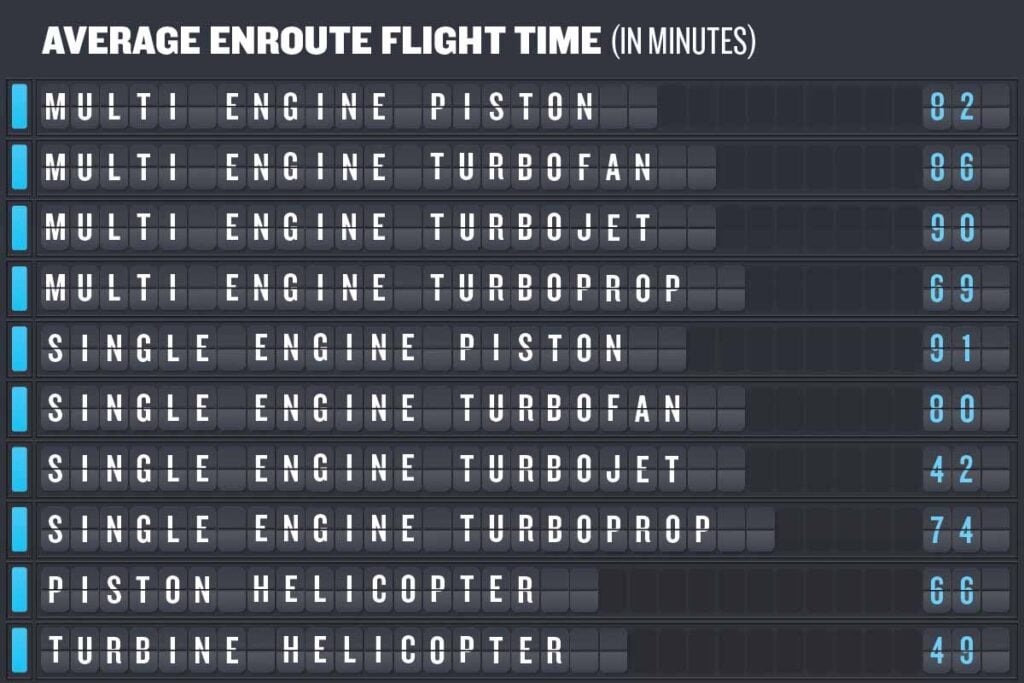
Average Enroute Flight Times for Each Type of Aircraft
Of course, pilots of a wide variety of aircraft use FltPlan, and that includes unpowered air balloons and glider aircraft. With an average flight time of 78 minutes for all aircraft, the data shows that fixed-wing single engine turbo-jet journeys tend to be the shortest — about 42 minutes on average — with rotorcraft (helicopters) posting average flight times of less than an hour. For longer flights, fixed-wing single engine 2-cycle aircraft on average spent almost two hours—about 116 minutes. Where does your engine fit into the mix?
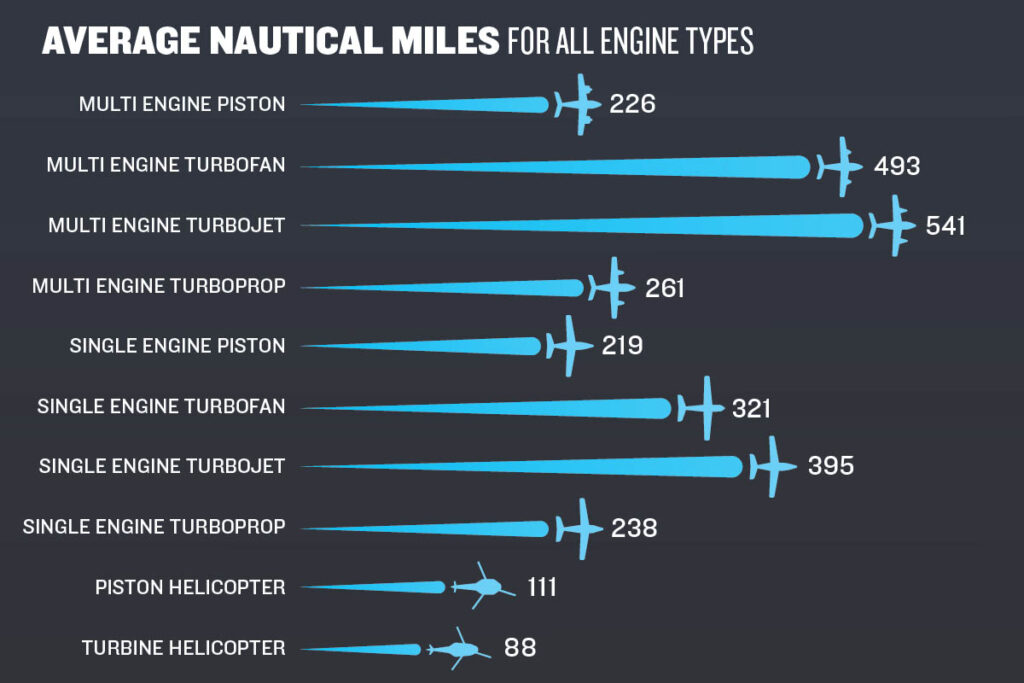
Average Nautical Miles for All Engine Types
So we know how long you’re spending in the air — but how much ground are you actually covering? The below figures represent the average nautical miles flown for each type of engine.
HOW MANY?
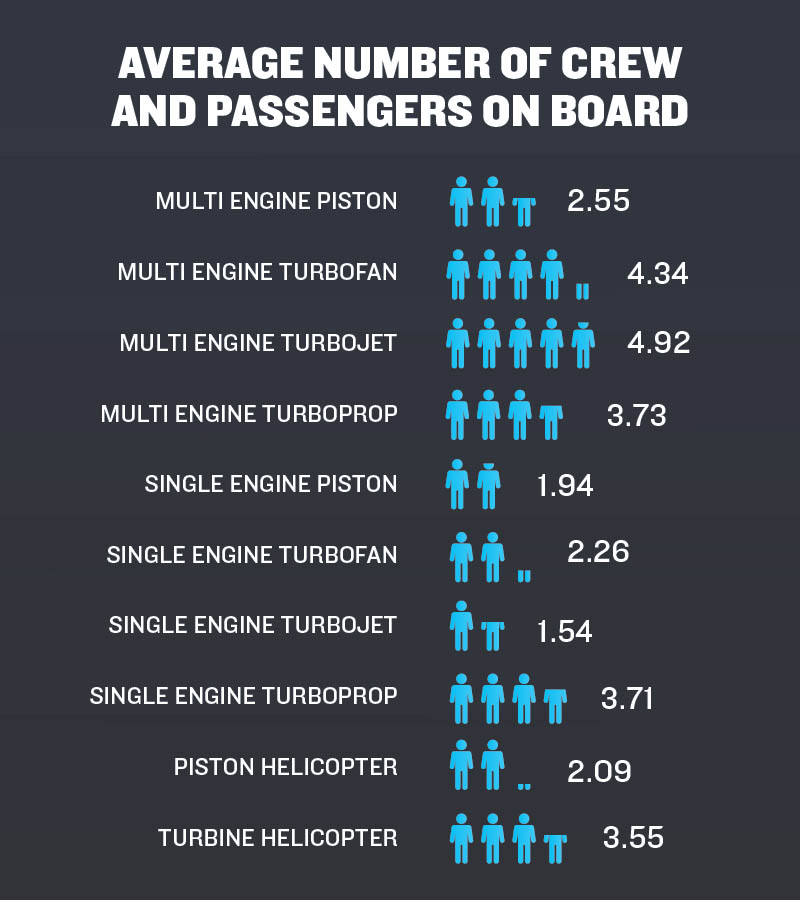
Average Number of Crew and Passengers on Board
FltPlan data showed that most of you like to fly with a companion or colleague on board, too.
Not sure where you fit in? FltPlan is a free flight planning and filing website that covers the U.S., Canada, Mexico, the Caribbean, Central America, Panama, and parts of Venezuela and Columbia — and registering only takes a few minutes.
The post FltPlan Data Offers Insights into General Aviation Pilot Habits appeared first on Garmin Blog.
https://www.garmin.com/en-US/blog/aviation/fltplan-data-offers-insights-into-general-aviation-pilot-habits/
Don’t Miss the 2023 Garmin AirVenture Oshkosh Experience
Are you ready for Oshkosh? We are too. Oshkosh is our aviation family reunion, and we’re thrilled to see you there. Below are a few of the can’t-miss items from Garmin coming to Oshkosh 2023:
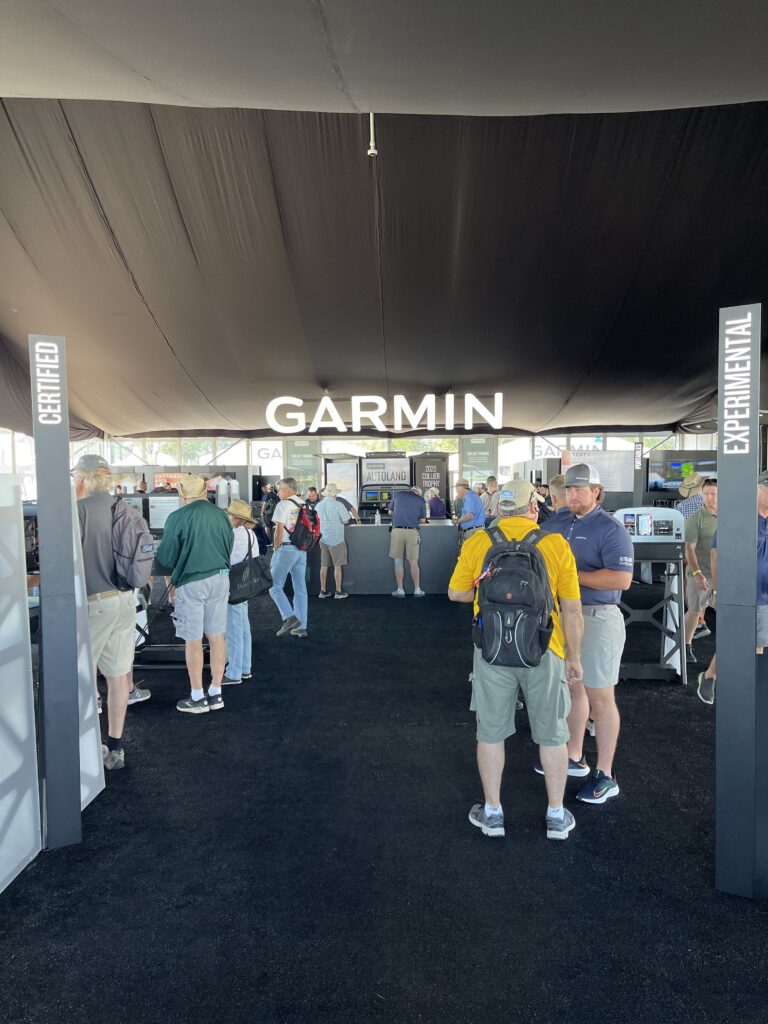
Navigate to our new exhibit.
No need to pull up a chart; we aren’t moving far. Our new expanded exhibit space is along the western edge of Boeing Plaza, next-door to our old location. Find an additional tent for Garmin Aviation Training team seminars, new static display airplanes and more information on your favorite Garmin avionics inside our air-conditioned main exhibit. While enjoying the cool air, purchase discounted navigation databases, speak with our sales and engineering associates about your next navigator upgrade, or geek out with dozens of kiosks to lay out your next panel.
Airplanes? We’ll have them in our display.
Looking for dream examples of Garmin-upgraded panels during your Oshkosh visit? We’ll have five prime examples of Garmin-equipped airplanes in our exhibit. For the experimental lovers, we’ll have Mike Patey’s Lancair Turbulence and Matt Steiner’s Velocity, both featuring our G3X Touch flight displays and GTN
flight displays and GTN Xi navigators. For the certified crowd, we’ll have Stevie Triesenberg’s YouTube-famous Beechcraft Bonanza, Two One Charlie, as well as Jason McDowell’s Cessna 170B for the 75th anniversary of that type. Keep your eyes peeled for another special surprise vintage aircraft in front of our exhibit too!
Xi navigators. For the certified crowd, we’ll have Stevie Triesenberg’s YouTube-famous Beechcraft Bonanza, Two One Charlie, as well as Jason McDowell’s Cessna 170B for the 75th anniversary of that type. Keep your eyes peeled for another special surprise vintage aircraft in front of our exhibit too!

Talk to your favorite aviation ambassadors.
Who doesn’t love watching aviation ambassadors’ content on social media? Don’t miss your chance to say hi to your favorite ambassadors Mike and Mark Patey, Stevie Triesenberg (Bayflight), Max Weldon (CitationMax), Chris Palmer (Angle of Attack) and Josh Flowers (Aviation101). Be sure to snap a picture with them and post it to your own social channels, tagging @GarminAviation and #flyGarmin, to possibly be featured on the Garmin social channels yourself! Our ambassadors’ meet and greets will be at the Garmin exhibit Monday through Thursday at 10:30 a.m. CT.
Oshkosh discounts: navigation databases, portable promos and more.
Every Oshkosh-goer looks for “Oshkosh Specials,” and Garmin has one for you. Visit the Garmin exhibit to purchase navigation databases for your Garmin flight deck, flight displays or navigator at a discount. Our database team will handle the subscription details on your flyGarmin® account, and you can download the updates to your devices when you get home from Oshkosh. (You’ll need to provide the system ID numbers of products for which you’re purchasing updates at the show.)
Not in the need for discounted databases? We also have Seminar Bucks available for savings on select avionics purchases, as well as rebates on our aera® portable GPS lineup, D2 aviator smartwatches, GI 275 EIS, GPS 175 and GNC® 355 navigators. You must be present in Oshkosh to receive the discounts or seminar bucks, so be sure to come see us!
aviator smartwatches, GI 275 EIS, GPS 175 and GNC® 355 navigators. You must be present in Oshkosh to receive the discounts or seminar bucks, so be sure to come see us!
Flying to Oshkosh?
Flying behind Garmin avionics to Oshkosh? Be sure to let us know! Snap a picture of your Garmin panel, a screenshot of the Garmin Pilot app or your Garmin portable device, and tag @GarminAviation on social for a chance to be featured on our channels!
app or your Garmin portable device, and tag @GarminAviation on social for a chance to be featured on our channels!
Still have questions? Visit our Oshkosh landing page for more information on what you can experience at our exhibit. Rock your wings, and welcome to Oshkosh!
The post Don’t Miss the 2023 Garmin AirVenture Oshkosh Experience appeared first on Garmin Blog.
https://www.garmin.com/en-US/blog/aviation/dont-miss-the-2023-garmin-airventure-oshkosh-experience/
Chris Palmer (aka Angle of Attack) Dubs Garmin GI 275 EIS a Must for Older Planes
The flight instructor and aviation YouTuber says the peace of mind provided by his GI 275 is irreplaceable when working in the wilds of Alaska.
Chris Palmer is a career certified flight instructor and the founder of an Alaska-based flight school, Angle of Attack. So when considering instruments for the panel in his Cessna 172, he prioritized efficiency and ease-of-use — and the Garmin GI 275 Engine Indication System (EIS) was a no-brainer.
“It really cleaned up my panel,” Palmer says. “I had those old mechanical instruments that were unreliable and inaccurate, and now I have by-the-number accuracy on the 275. It also gives you at-a-glance information, so instead of looking at the number directly, you may just look at it being in the green or red or yellow. And of course, the user interface for those instruments is so good that if anything is wrong, you’ll see a notification right away, so that’s really nice as well.”
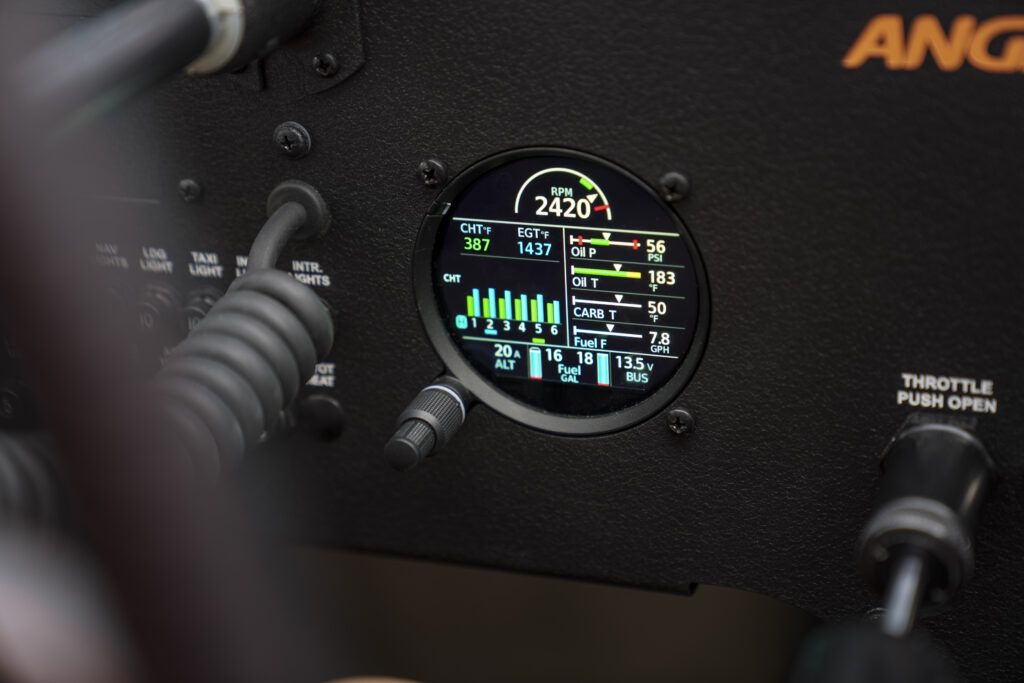
But the biggest advantage of the GI 275, he says, is that the primary engine monitoring solution replaces all analog engine gauges. In one display, you can easily ascertain engine, fuel and electrical information, allowing you to fully manage engine operation with all the readouts you need in convenient location — with multiple pages for easy access.
“It replaced every instrument on the righthand side of my panel. It’s now all down to one round dial instrument, which leaves room for other activities.”
For Palmer, who flies predominately in what he dubs the inhospitable terrain of the Alaskan bush, his favorite component of the EIS is less a specific feature and more a feeling it inspires.
“It’s about the peace of mind,” he says. “I came from very primitive engine information to where now I have everything I could ever want. You do not want engine problems out here. So having that insight into my engine at all times has been extremely comforting — I didn’t realize how much anxiety it was causing me to not have all that information.” Now he can monitor every cylinder. “It just gives me comfort knowing that if I see trends or see something wrong, I can be ahead of it and potentially land somewhere if there’s an issue.”
Another bonus to choosing Garmin to manage your engine operation? “I really like that it’s not a set-in-stone piece of hardware — in other words, Garmin updates over time. They’ve already updated the user interface, and I like that about it because you get new and improved information and layout.”
In his work with his flight school, Palmer encourages pilots (and aspiring pilots) to take the plunge and install a GI 275 EIS.
“There is so much going on in your engine that you don’t realize, and you’re kind of just at the mercy of your mechanic and the maintenance process and whoever is maintaining your airplane, without having the information at your fingertips all the time. And again, going back to it, just the sense of comfort —your engine is the most important thing on the airplane other than the wings. All the time that it’s running well and you’re not having issues, it’s blissful ignorance without an instrument like that. I don’t like blissful ignorance anymore — I’d rather have my information, and if it’s not good news, then I’ll get on the ground, and I’ll be safe. Out of all the instrumentation I upgraded with the airplane, my engine monitor, the GI 275, is my favorite, and it’s the one I appreciate the most.”
To learn more about the GI 275 EIS, click here. Visit Palmer’s YouTube channel, Angle of Attack, for aviation education and entertainment, or angleofattack.com to learn more about online ground school.
The post Chris Palmer (aka Angle of Attack) Dubs Garmin GI 275 EIS a Must for Older Planes appeared first on Garmin Blog.
https://www.garmin.com/en-US/blog/aviation/chris-palmer-aka-angle-of-attack-dubs-garmin-gi-275-eis-a-must-for-older-planes/
Six Lessons Learned from a Garmin Panel Makeover
Josh Flowers and his father bought N80991, a 1976 Cessna 172 Skyhawk, more than 9 years ago. Since then, that aircraft has become the centerpiece for the online aviation videos he posts as @Aviation101Films that share the passion and craft of flight. When it came time to redo the interior — creating his “better than brand-new 172” — it made sense that the Garmin ambassador would give the airplane a full Garmin panel.
But adding the new avionics — including dual G3X Touch flight displays, a GTN
flight displays, a GTN 750Xi navigator, a backup G5 display, a remote Garmin audio panel, GNC® 255 radio, GTX
750Xi navigator, a backup G5 display, a remote Garmin audio panel, GNC® 255 radio, GTX 345 transponder, GFC
345 transponder, GFC 500 two-axis autopilot with auto trim and more — required a full redo of the panel. It was an exhaustive process. It’s no wonder, then, that he has some valuable lessons to share that can help you navigate a panel upgrade of your own.
500 two-axis autopilot with auto trim and more — required a full redo of the panel. It was an exhaustive process. It’s no wonder, then, that he has some valuable lessons to share that can help you navigate a panel upgrade of your own.
1. Pick a shop you trust.
You’ll spend a lot of quality time with them, and they’ll spend many man-hours inside your airplane. Plus, you’ll be flying behind their work, sometimes in IMC conditions. Professionalism, attention to detail and meticulous work are key.
“Seeing an airplane that you’re so familiar with be gutted down to the aft side of the firewall gave me an overwhelming feeling of ‘what have we done?’” Josh says. “I knew good and well the experts at Daytona Aircraft Services were going to take their time to do this project right, and this airplane was going to be far better and safer than it was on the trip out there.”
2. Gut it if you can.
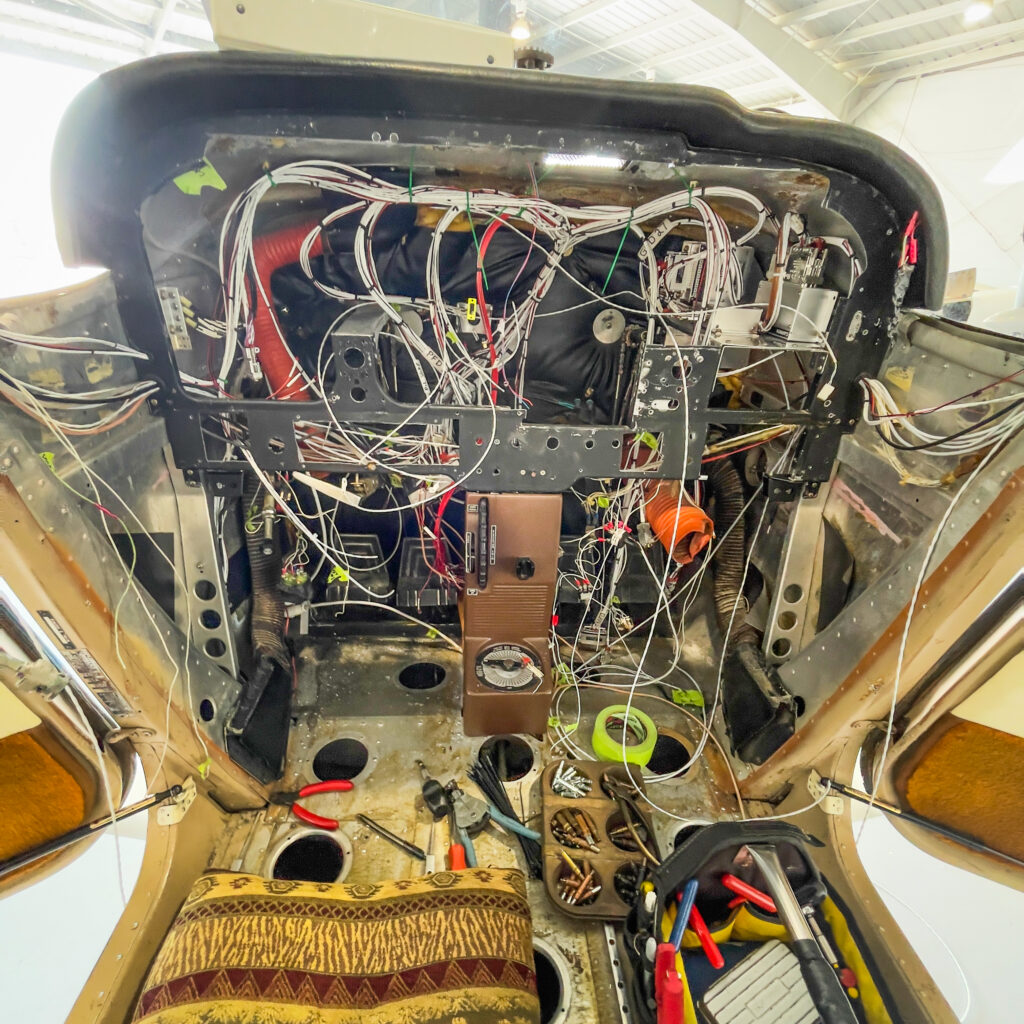
The shop crew started disassembly by tracing every wire — what it’s from and where it goes. They removed wiring from previous upgrades that didn’t need to be there anymore, then freshly rewired the whole airplane. That was a mind-blowing experience, Josh says, seeing how much stuff can be wrong or unsafe in an airplane that pilots don’t even really know about — and don’t even notice. “I think that’s why it’s so important that, if you’re going to do a major retrofit like this, you’ve got to gut it,” Josh says. “You’ve got to pull everything out and just redo everything.”
3. Measure twice, cut once.
Creating a custom panel is part art, part technical skill, and the shop used a multistep process to get everything to fit properly. They started with a generic CAD drawing of the panel for his model Skyhawk, cut a panel out of clear plastic on a CNC router for a trial fit, tweaked the drawing where changes were needed and made new versions.
“They basically keep cutting new plastic pieces as many times as they need until the design is laid out and fits everything in the airplane perfectly,” Josh says. “Then they’ll cut their final panel out of 0.090 aluminum using that final CAD design.”
Ultimately, they moved switches to more logical places and added a Garmin GSB 15 USB port, Garmin Smart Glide
15 USB port, Garmin Smart Glide switch, a CO detector and 406 MHz ELT remote switch. They also refabricated mounting rails to position the G3X Touch displays over the yokes and center the avionics stack so they could install the new equipment securely. The goal wasn’t just to make the panel attractive, but also to make it strong and stout. “I am mind-blown by this shop’s attention to detail,” Josh says.
switch, a CO detector and 406 MHz ELT remote switch. They also refabricated mounting rails to position the G3X Touch displays over the yokes and center the avionics stack so they could install the new equipment securely. The goal wasn’t just to make the panel attractive, but also to make it strong and stout. “I am mind-blown by this shop’s attention to detail,” Josh says.
4. It takes time to test everything.
While the panel may look finished once everything is installed, there’s still a lot left to do. The shop went through every single setting and configured systems for the airplane as laid out by the Garmin Supplemental Type Certificate. That includes such minutia as autopilot servo torques and gains, checking CAN bus communication to ensure the networked avionics talk among each other and complete troubleshooting. “This takes a long, long time, and it’s very tedious,” Josh says.
At the end of the installation, a new weight-and-balance calculation indicated the aircraft gained 60 pounds over its logbook weight. Josh attributes that to imprecise record-keeping over the life of the airplane. That could have serious implications when it’s flown near gross weight, so it’s critical insight as he flies the aircraft into its second life.
5. Learn the new equipment.
The airplane had dual G5 flight instruments, so Josh was familiar with flying behind an EFIS. But while the full panel added awesome new cross-country capabilities, it also injected new levels of integration and greater complexity into Josh’s flying. Before he ever flew his upgraded airplane, he smoothed the avionics learning curve by training in Daytona Aircraft Services’ RV-7, which has an almost identical panel.
“I’m finding that letting the autopilot completely do the approach for you, it’s like another skill set to maintain situational awareness when you’re not the one actively flying the airplane,” Josh says. “I’ve been familiarized with all these avionics. But I have some proficiency to catch up on with this entirely new panel.”
6. Make sure everything works before you depart.
Once the retrofit was complete and he was up to speed, he flew several flight-test missions with shop pilots to ensure everything worked properly. That attention to detail is an important final step. “They want to get things right the first time instead of rushing through it, and the customer having to bring the airplane back to them with an electrical or mechanical issue,” Josh says.
Now that he has the airplane back, he’s excited by how gorgeous — and now how safe — his airplane has been put together. It’s practically a different airplane, and he’s ready for the aviation adventures it’ll make possible.
“This autopilot, the dual G3X Touch, the GTN 750Xi, I think all of this is going to be a game-changer for me — it’s going to make me enjoy cross countries more,” Josh says. “I’m super excited about all of this.”
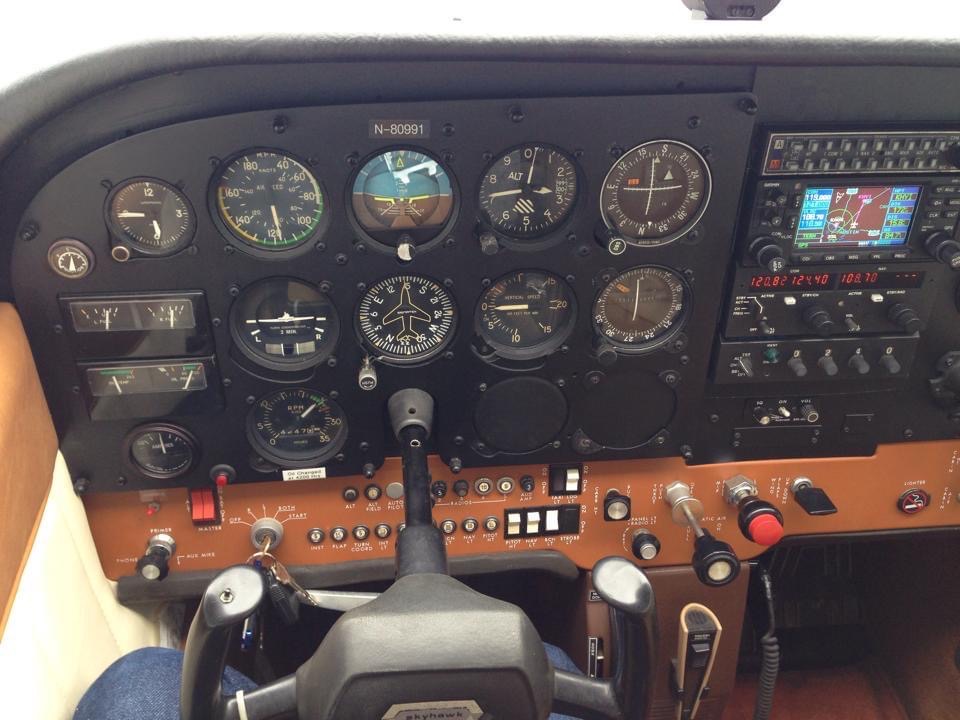
The post Six Lessons Learned from a Garmin Panel Makeover appeared first on Garmin Blog.
https://www.garmin.com/en-US/blog/aviation/six-lessons-learned-from-a-garmin-panel-makeover/
